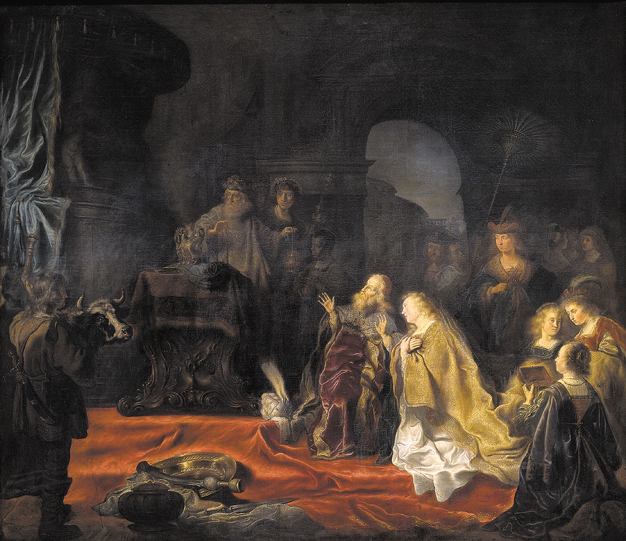Athens and Jerusalem

The Bible: Wisdom Literature
Jewish Family Education With Candace R. Kwiatek, The Dayton Jewish Observer
Grocery shopping with a cranky grandbaby means a quick stroller run-and-toss through the aisles, a task I recently accomplished in a record 13 minutes.
While unloading, however, I discovered two overlooked cartons of eggs in the stroller’s boot. What was my obligation?
Another dilemma arose from a faulty crib mobile. The online company opted to refund my money rather than have me return the item. With nothing to lose, I managed to fix the mobile. Since I now possessed a working product for which I hadn’t paid, what was my obligation?
Today, people too easily write off these situations as non-issues. No one saw me “take” the eggs without paying. The toy company didn’t know I was using the mobile. Why should I feel any obligation?
Questions about what is good and how should I behave are in the realm of morals and ethics, the primary concern of the Bible.
But today’s increasingly secular societies look elsewhere: the heart, reason, or the law.
“My values come from my heart” is a common assertion by those who believe people are generally good. It turns out the heart as a moral guide has some significant downsides.
Hearts are fickle and fallible judges, buffeted in the moment by emotions, experiences, and desired outcomes, creating a kind of moral rootlessness.

Believing we are inherently moral may have a more ominous consequence as well. In a recent study, researchers at the University of London discovered people strongly believe they are moral but irrationally believe they are more moral than the average person.
This “self-enhanced moral superiority could erode our own ethical behavior,” writes psychology professor Cindi May. She explains it may actually encourage future immoral actions, an effect known as “moral licensing,” documented in related studies on workplace behavior, charitable giving, and more.
In the Bible, the heart as a moral wellspring appears most notably in tales from Judges through Kings.
“Every person did what was right in his own eyes,” intones the Book of Judges, an era that devolved into kidnapping, rape, murder, and general barbarity.
Swayed by his heart’s desire for Bathsheba, King David solved the problem of adultery by devising a battle death for her husband, Uriah.
Even the heart of the notably wise King Solomon was seduced by treasure and pleasure, to the ultimate ruination of the United Monarchy.
The pattern comes full circle as kings of the subsequent divided kingdoms pursued “what was right in their own eyes.” It turns out the heart isn’t sufficient to be a moral guide.
Beginning with the philosophical inquiry of the Greeks and renewed during the Enlightenment, reason became the key to morality.
Commentator Dennis Prager points out four problems with reason. An amoral tool, reason can argue for evil as well as for good. Like the heart, reason is influenced by passions, psychology, and experiences, and must begin with the premise that people are basically good. Finally, even if reason does lead to a moral conclusion, it doesn’t compel moral action.
According to the Bible, humans do have a divine gift of reason, having been made in God’s image and eaten from the Tree of Knowledge of Good and Evil.
But Isaiah cautions, “Woe to those who are wise in their own eyes, and shrewd in their own sight!”
Proverbs similarly advises, “…do not lean on your own understanding.” It turns out reason isn’t sufficient to be a moral guide.
Throughout history, both the state and the law have claimed to be legitimate sources of morality. One of the earliest examples can be found in the epilogue to Hammurabi’s Code, where the Babylonian king boasts any man can read his laws to “…find out what is just, and his heart will be glad…”
The classic example is Nazi Germany. Founded on the perverted pseudoscience of eugenics, it created a matching moral order through civil law.
Similarly, for monarchism, Marxism, communism and a whole host of other “states” and “legal systems,” morality simply reflects the ruling-class ideology.
The Bible is clear about the inability of states and their laws to establish morality. The prophet Samuel warns Israel about kings who will rule with their own passions and interests at heart, taking tithes, commanding property, and turning citizens into servants and soldiers at will.
Much earlier, Deuteronomy foreshadows these warnings by commanding that kings not amass excessive property, wives, or wealth.
To be moral leaders, they should write for themselves a copy of the Torah, read it regularly, and keep its laws. It turns out neither the state nor law is sufficient to be a moral guide either.
Instead, for moral guidance we must turn to both Athens and Jerusalem. The philosophy and reason of Athens seek to answer questions about ultimate truths: what is good and what is the best way for man to live?
The Bible and its interpretations and commentaries represented by Jerusalem offer a transcendent moral law and ethical path balanced by reason and compassion. Heart. Reason. Law. No one alone suffices.
Literature to share
The Cholent Brigade by Michael Herman. When a neighbor is injured while helping his community, the whole neighborhood pitches in with a cholent brigade. In this heartwarming tale, young children are introduced to the mitzvot (commandments) of gemilut chasadim (loving kindness) and bikur cholim (visiting the sick) and how they make the world a better place. To enhance learning about the traditional Sabbath dish known as cholent, there’s even a recipe to try. A wonderful book for discussion and a shared cooking experience.
Why Judaism Matters: Letters of a Liberal Rabbi to His Children and the Millennial Generation by Rabbi John Rosove. Written as a kind of ethical will for his children, Rosove’s series of letters makes the case for identifying as a serious liberal Jew. Drawing upon Jewish wisdom, his own rabbinic experiences, and personal introspection, Rosove explores four main topics: the essence of liberal Judaism, love and marriage, good and evil, and how to live a good life. Respectful of views across the liberal spectrum, Rosove’s writing is thoughtful and clear, interesting and compelling.
To read the complete January 2019 Dayton Jewish Observer, click here.


